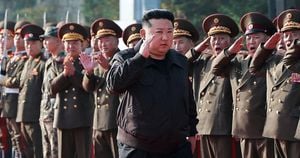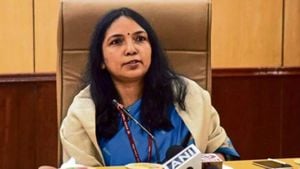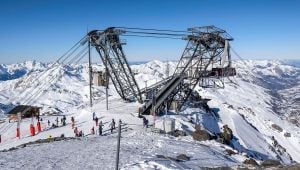Abkhazia, the breakaway region of Georgia, has been thrust back to the forefront of political turmoil as its president, aslan bzhaniya, resigned amid widespread protests sparked by plans for Russian investments. The upheaval erupted when demonstrators stormed the parliament last week, voicing their opposition to proposals perceived as compromising the region's autonomy and environmental beauty.
The political situation unfolded dramatically. Bzhaniya announced his resignation on November 19, 2024, stating, "To maintain stability and constitutional order... I resign from the post of President of the Republic of Abkhazia,” as reported on social media. This decision follows intense protests over his administration's dealings with Russia, raising alarms among residents fearing the potential loss of their land and culture.
The unrest began earlier last week as rumors circulated about Abkhazia entering a significant partnership with Russian investors, aimed at real estate projects. Resentment brewed quickly, fueled by previous experiences where Russian influence led to significant changes, often detrimental to local interests. Protesters argued this deal would invite apartment complexes, fundamentally altering the region's character.
Protests intensified, with demonstrators blocking roads and rallying outside government buildings. They expressed concerns about losing their historical lands to plans which seemed more aligned with Russian expansion than protecting local interests. Activists voiced their fears of becoming mere tenants on their lands, as was stated by one demonstrator, "Our region needs to be self-sustaining, not just another satellite of Russia!"
On November 15, the protests escalated, culminating as crowds stormed the parliament building, demanding accountability and the cessation of any deals with Moscow. The situation prompted the Russian government to issue travel warnings, advising citizens to avoid the popular tourist destination known for its picturesque landscapes and rich history.
Bzhaniya's resignation was part of the terms negotiated to restore peace. The president's office stated his deputy would assume the role of acting president, as per the agreement reached with the demonstrators. Reports indicated the protesters began to disperse, waving flags of Abkhazia, signaling perhaps their temporary victory but leaving the region’s future uncertain.
Abkhazia has been recognized by only a handful of nations and remains largely viewed as Georgian territory by the international community. It has been under de facto Russian oversight since the 2008 conflict between Georgia and Russia. This complex history has left Abkhazia caught between influences, struggling for its identity and autonomy.
Following the resignation, interim leadership decisions are expected to be announced, with many speculating on early elections. The changing political dynamics present opportunities for fresh leadership—the kind proponents of democratic governance are hoping for. Yet, the question looms; will the new leadership prioritize the concerns of its citizens, or will it lean back toward Russian interests?
Citizen involvement will be pivotal as the region navigates the aftermath of protests. Many are hopeful for reform and transparent governance. Activists have rallied their constituents to remain vigilant, insisting, "This is just the beginning! We must continue fighting to preserve our home!"
With the resignation of Bzhaniya, Abkhazia stands at the crossroads of defining its future. Will it seek to engage with Georgia and the world as independent, or will it remain under the heavy shadow of Moscow? The forthcoming days are set to play a decisive role, not only for the political future of Abkhazia but also for the broader geopolitical tensions surrounding Russian influence and territorial integrity.
Bakhtiyar Jumyev, head of the independent political organization Unity for Abkhazia, commented, "This moment is historic; we must seize this opportunity to advocate for our rights and identity. The people deserve to have their voices heard and have control over their own future."
The events occurring within this small, picturesque region could act as precursors to larger political transformations within other areas of the Caucasus. The world watches with bated breath, waiting to see if Abkhazia can stabilize and thrive beyond the heavy influence of external powers.



